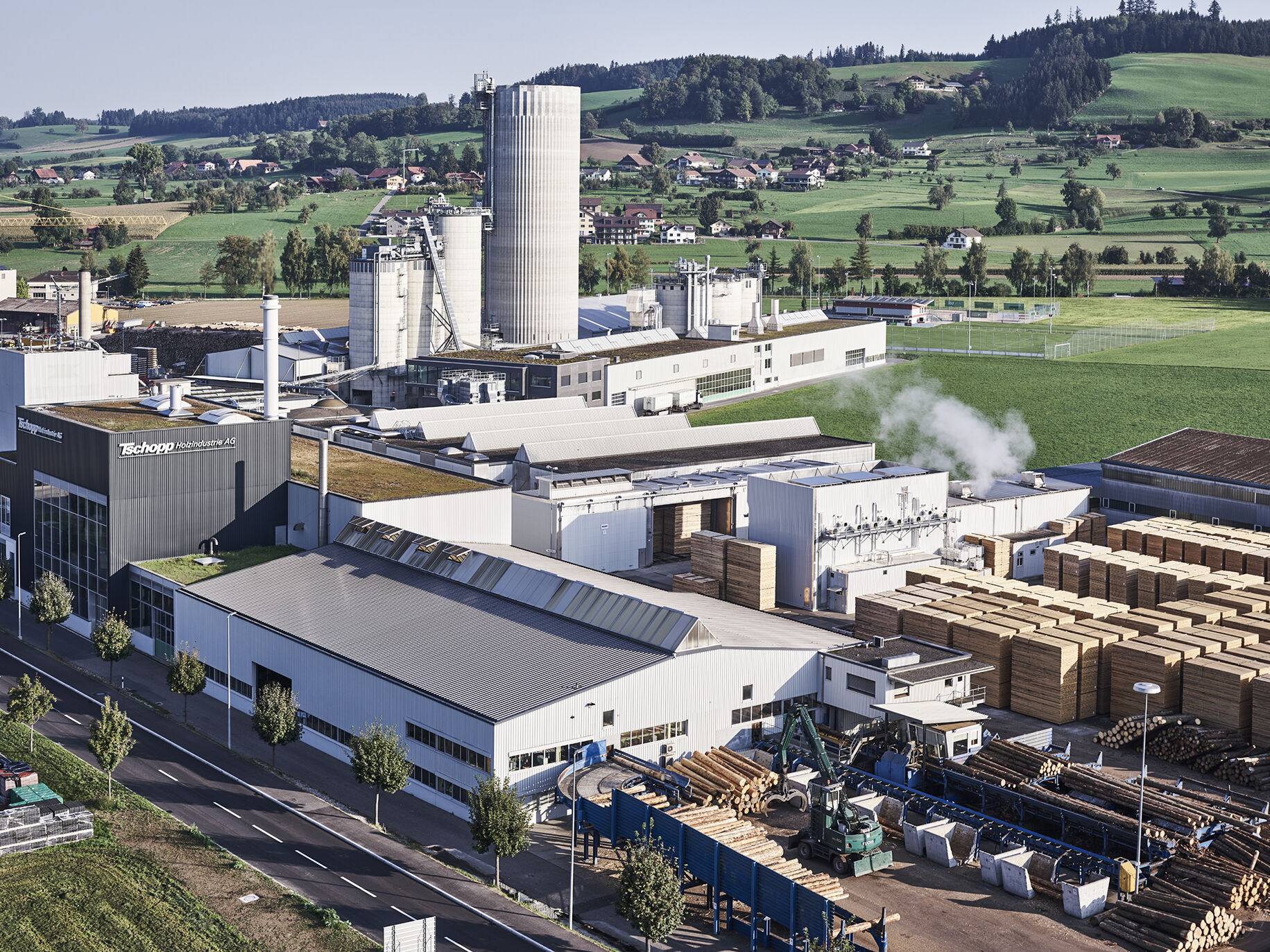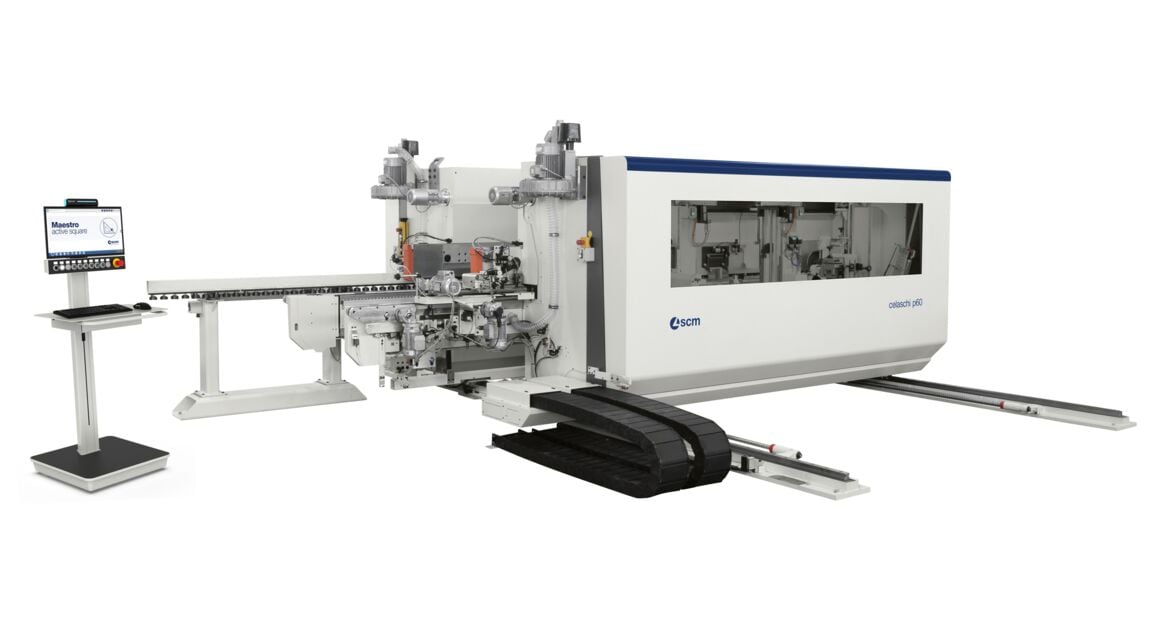
Investment in the future: Double-end tenoner for a new production line
Timber construction technologies

Tschopp Holzindustrie AG in Buttisholz produces up to 6,000 shuttering panels per day, or over 1.5 million square metres of panels per year. In August last year, a new double-end tenoner from SCM, the Celaschi p60, was successfully installed. "Our double-end tenoner is part of a production line at Tschopp Holzindustrie AG and is responsible for profiling the lengthwise edges of the shuttering panels," says Daniel Ott, Country Manager Switzerland, SCM Switzerland (Rothenburg).

Healthy growth, continuous development, continuity, long-term thinking and fairness have characterised the history of the Tschopp Holzindustrie AG family company since 1920, now spanning three generatiotransvens. As stated from the Managing Directors Ronald and Daniel Tschopp,
"We think and act with foresight and sustainability. Thus, we focus fully consciously on the needs of our local business partners.".
Commitment to sustainable production
All the round wood for the production comes from Swiss forests. All products (except shuttering beams) are manufactured at the Buttisholz site and sold in Switzerland. This focus on the Swiss market ensures fast response time and short transport distances.
"The 100% reuse of the raw material at a single location allows us to produce ecologically while simultaneously adding the highest possible value. As a commitment to sustainable production, all the electricity for our company comes exclusively from Swiss hydroelectric power.".



Wood pellets and green electricity
The company has been producing high quality wood pellets since 2005, thanks its many years of experience.
The plant has a capacity of 130,000 tonnes of pellets per year and is the largest in Switzerland. The manufacturing process is highly automated and permanently monitored. In addition to their own waste wood, the company also processes untreated waste wood – such as wood shavings, sawdust and wood chips – from Swiss wood processing companies and sawmills, converting it into wood pellets.
The heat requirement for drying the waste wood is provided by the company's own wood-fired power plant. The bark from their sawmill, as well as used shuttering panels and recycled wood from their customers, are used as fuel for the plant. A perfect wood cycle – CO2 neutral. With a total storage capacity of 16,000 tonnes in bulk and in 15 kg bags, the company is a reliable supplier to the energy industry.
In addition to the bark from their sawmill, recycled wood of classes A1 and A2 in uncrushed form is used as fuel for the wood-fired power plant. The recycled wood is efficiently and professionally transformed into high-quality fuel for the power plant.
Tschopp offers their customers disposal services for their used materials. This means that the products come back and are recycled to produce energy. In total, the business converts 18,000 tonnes of recycled wood into ecological energy every year, in addition to the bark. The electricity, sustainably produced using an ORC turbine, is fed into the local supply grid. The waste heat from the turbine is used entirely to dry the sawn timber for the panel plant and the residual wood for the pellet production.
Furthermore, some apartment buildings are supplied with heat via a pipeline.

Safety in construction: shuttering beams and panels
Thanks to high-quality workmanship and advanced construction techniques, the Buttholz H20 shuttering beams have a significantly longer service life than conventional products. The impact-resistant protective cap system on the walers prevents damage due to falling and increases the service life of the shuttering beam. The central web made of three-layer panels with predominantly standing annual rings is ideally suited for load-bearing applications outdoors.
Intensive use, temperature fluctuations and the effects of the weather take an enormous toll on a shuttering panel. Klaus Lindner, Manager of the Panel Plant: "Our shuttering panels have a longer service life thanks to innovative technology and unique construction techniques."
Quality assurance and increased productivity
The carefully finished and coated panel surface guarantees clean concrete surfaces. The panel edges have a unique, four-sided melamine-based edge sealing.
"We guarantee the highest dimensional and angular accuracy. Thanks to the modernisation and the new production line, we have achieved higher quality and our productivity has increased," Lindner is pleased to say. "We implemented this quality assurance with SCM Switzerland.".


Double-end tenoner for a wide range of materials
The SCM Celaschi P60 is the new double-end tenoner, ideal for a wide range of materials. Designed for multi-shift operation, this machine can be used for processing solid wood and panels of any type, as well as other materials (PVC, cement fibres, rock/glass wool, insulation material, plaster, etc.). "SCM's Celaschi p60 solution also performs other operations such as sizing, sanding, drilling, bevelling and grooving" explains Daniel Ott. "It offers a wide range of machining options: Tenoning, cutting-off, profiling, grooving of through/blind channels, squaring, sanding, drilling and chamfering."
The advantages are quantitatively high production results (both as a stand-alone version and as an integrated version in highly productive lines benefitting from the workpiece transport system with feed speed up to 60 m/min), the great variety of machining operations, as well as easy and rapid programming, thanks to the eye-M-PRO touch screen control panel and the Maestro active square machine software.
Highest precision and reliability
The "celaschi" tenoning, profiling and squaring technologies boast a very long tradition dating back to 1917, the year in which the company of the same name was founded, later acquired by the SCM Group, together with the equally renowned Gabbiani company. Thanks to these high-tech solutions, SCM is able to supply double-end tenoners for machining all types of parquet, doors and solid wood door elements, wooden panels and other materials.
"Our double-end tenoner is part of a production line at Tschopp Holzindustrie AG and is responsible for lengthwise profiling of the shuttering panels," says Ott. The machine has a feed speed of 60 m/min. It is equipped with a large 21.5" colour display, our eye-M-PRO console with integrated PC. The machine frame is designed for the highest precision, reliability and finishing quality. This is achieved using a ring-type, monolithic frame made of steel.
The adjustment of the mobile beam occurs through a pair of ball screws for maximum rigidity and stability. Both the fixed and the movable beam are a solid support for the operating units, the feed chains and the top pressure belts.

Two operating units are installed at each machine side for profiling operation. In fact, the machine is equipped with two high-precision electrospindles 4 kW for scoring operation, with CNC horizontal and vertical adjustment, and two hogging units with high-precision electrospindles 13,2 kW with CNC horizontal adjustment.
No unforeseen surprises
The project was started by Tschopp Holzindustrie AG in 2019. "The planning went smoothly and the binding delivery and assembly date (2 weeks in July 2020) was met, despite the difficult time that everyone knows about", says Lindner. "At SCM, it is always important for us to involve our specialists from the plants in Italy in relevant projects. This allows us to clarify all points at a very early stage of the project and to make sure that there are no surprises later," Ott explains. An important point was also the interface for the integration of the machine into the complete production line. The integration was also carried out in consultation with the other production line partners.
"Thanks to the central location of SCM Schweiz AG, we can always be at the customer's site very quickly if any issues arise. Local customer service, in consultation with the plant in Italy, is of central importance to us," Ott is pleased to say. SCM is therefore currently also investing in the further expansion of the Swiss branch in Rothenburg.
Lothar Mayer (HBS holzBaumarktschweiz 03/2021)

Tschopp
Fill out the online form to be contacted by a salesperson

